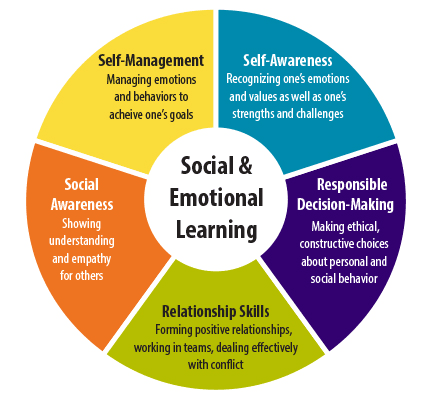In the words of my homework-hating, middle school child, “Why do we even have to learn this? When am I ever going to use this in real life?”

How much of what we learn in school do we use in everyday life?
When we think of K-12 education, we think about core subjects like Math and Literature. We place importance on kids gaining knowledge that will prepare them for their future. Or, as almost every teacher has said at least once, “the real world.” Cue the eye rolls from the back of the class.
Of course the subjects covered in our schools are important and most teachers do their best to convey the material in an engaging way. But realistically, what percentage of your high school chemistry facts do you remember and use regularly? For those who went on to be chemists, probably all of it. For the rest of us, you’d have to really dig deep!
How much of what we learn in school do we use in everyday life?
Humans are social beings. Social interactions, including meaningful relationships, are correlated with happiness, health and longevity. How to effectively cultivate these connections is a skill to be learned and reinforced. Our knowledge of ourselves, and others around us is the foundation upon which all the other skills lie.
Then why is it not given the same weight as the traditional core subjects or extracurriculars? What could possibly prepare our kids better for the “real world” if not the basic understanding of human literacy?
What we’re spending our money on
We parents want as many doors open as possible for our kids. And we are willing to pay for it. In 2017, 37% of families said they planned to spend over $1,000 per child and 20% $2,000 per child on enrichment activities. The sports industry for children alone is worth 15.3 BILLION dollars! All this money is viewed as an investment in the future success and the happiness of our kids.
How is our current model serving us?
The fact that today’s personal growth market is assessed at an astounding $10 billion shows that as adults we not only value interpersonal skills like self-awareness and social relatedness but that we don’t feel particularly adept at it.
Looking ahead
We need to prepare our kids for the real world and that is not the one in which we grew up in. Long-term job stability has given way to the gig economy. The jobs themselves are different and people are more attuned than ever to finding purpose in their lives.
Our kids will have to be flexible learners, initiative takers, and comfortable interacting with a plethora of people. It is imperative for them to understand how to manage their emotions, self-reflect, and understand the point of view of others. They’ll have to learn to read the room and between the lines.
These skills, just like basic arithmetic, must be explicitly taught and practiced. Our social emotional skills cut across every domain in our lives as they are what makes us who we are. Thus they need to be interwoven in our curriculums and top the list of parenting priorities.
